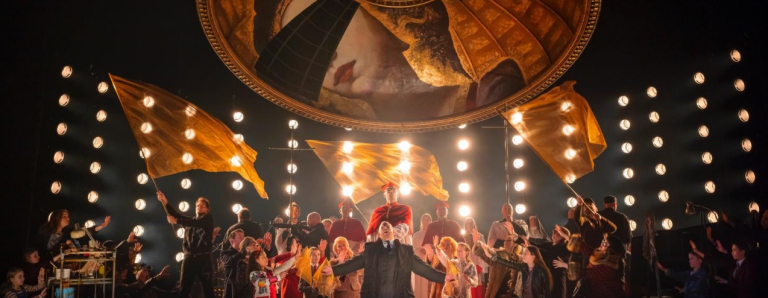Starry nights for Pinchgut – twin talk with Castor and Pollux

It was like trying to keep up with two fine young colts let loose to play after training.
Jeffrey Thomson and Hadleigh Adams are in Sydney to sing the twin male leads in Jean-Phillipe Rameau’s Castor and Pollux, which is to hit the boards at the City Rectal Hall under the auspices of Pinchgut Opera, next week. After sitting in on the morning’s rehearsals, we stretched out at lunchtime to talk about their roles.
Stars in more ways than one, they are part of an exceptional ensemble conducted by Antony Walker. Walker, along with his Co-Artitistic Director of the company, harpsichordist Erin Helyard, and Director Kate Gaul, have assembled the elite of Sydney’s chamber musicians and production talent to realise this Baroque masterpiece. Sopranos Celeste Lazarenko, and Anna Fraser, mezzo-soprano Margaret Plummer, tenors Mark Donnelly and Pascal Herrington and bass Paul Goodwin-Groen with Cantillation as the chorus, will strut their stuff in costumes designed by Jasmine Christie, under a set by Andy McDonnell, the like of which has never before been seen in the City Recital Hall.
In 2002 Pinchgut Opera began presenting Baroque operas of such exceptional performance quality, stylistic integrity and creativity, that its now keenly anticipated productions have become a fixture in Sydney’s concert calendar….and yes, it’s the 10th year and the 11th production for the company which oversaw the revival of this previously neglected genre in Sydney. Handel’s Semele was their inaugural venture; Castor and Pollux is their 10th, and their second opera by Rameau.
The productions have been memorable. Like Olympic high jumpers, Pinchgut seems to set the bar higher each year, returning undaunted to nudge it higher again. This year, they have brought to Sydney, the American born, Paris based Jeffrey Thomson and New Zealand born, London based Hadleigh Adams. As the mortal twin Castor, Thomson spins the rare sound of the haut-contre. Adams, a rising exponent of the bass-baritone repertoire sings the role of the immortal Pollux.
Together, they make an unlikely combination that complements and contrasts. They’re of similar height, but Thomson’s fair complexion is a foil for, Adams’ darker looks; their sentences bounce off each other’s, but as the conversation progresses, they begin to complete ideas for each other and even leave thoughts unsaid, each knowing what the other means. “Fundamentally”, as Adams says, “we have a lot of fun. We have an interesting dynamic – we bicker back and forth, we’re sarcastic – and we don’t even realise we’re doing it.”
Thomson interjects: “He got immortality; I got the high notes” referring to the symbolism of the roles allocated to the twins. The mortal Castor, is subject to human frailty and death, but sings in the stratosphere, while Pollux, the immortal, is grounded in a bass tessitura.
Adams observes “It goes back to how they are as brothers. They gave each other strength.” He continues, adopting the persona of Pollux: ” Though I am immortal, there is an awareness in me of human affection and I have the ability to give up everything – including life – but I’m ok with that. I’m very loving which gives me freedom within my strength.” He denies that there is darker side to Pollux. “It does happen that you try to find the darker side to a character – to find their human side – but Pollux is not human. He is of another world and he not only gives up the one woman he loves, but will enter hell as well.”
Whilst Pollux contemplates what he renounces, ‘Castor’ describes his character as one which doesn’t really have to undertake a journey. Instead, the role is for the virtuoso. “In the tradition of the French Baroque, I get the best arias – I get more lyrical music. The role was written for Monsieur Tribou, the Baroque Pavarotti of the day, and they broke in these pieces for him. My first ‘recit’ is literally just showing off – but this is my repertoire – this is all I do and it makes complete sense to me. This is why love French Baroque music- it is so passionate, so sexual and so sensual. People think it’s all pretty, but it’s not.”
Inexplicably, despite a strong cast, Rameau’s original 1737 version of Castor and Pollux was not well as received as his previous two operas, Hippolyte et Aricie and Les Indes galante. Castor and Pollux was forgotten for 17 years until a 1754 revival for which the zeitgeist was ripe. This is the version we will see in Sydney. ‘The twins’ offered their insights. According to Thomson, “It was the height of the problems with Lully’s legacy. Rameau’s work was so totally new in 1737. By the time of the version that we’re doing, the singers had all changed and they were respected performers which gave the opera more credibility.”Adams adds “Rameau went right to the bottom of his bag of tricks, but audiences were so fixed in terms of their expectation of French music that transformations and innovations weren’t appreciated at the time.”
Rameau’s innovations went as far as to cause a bitter division between the conservatives who deemed Lully’s works as the “father of French opera” to be sacred. Rameau’s style was considered an attack on these values and audiences drew a battle line with the Lullistes on side and the Rameauneurs (or Ramistes) on the other.
Thomson draws another disctinction. ” Lully required actors who could sing and Rameau required singers who could act.” Adams’s adds that Lully’s music doesn’t require a big tessitura and singing hadn’t evolved to where it was with Rameau, by which time the singers were more proficient. Lully’s cast comprised voices that were still young and inexperienced; by Rameau’s time they knew more about the voice and were bolder with what they did – they sang higher and faster and much closer to the Italian style which is great big leaps and bounds, but still unmistakeably French.” Lully was declamatory whilst Rameau was virtuosic; Lully’s music was seen as simple and natural; Rameau’s was different, complex and even tasteless until time and familiarity paved the way to acceptance and now, immortality.
The voice of the haut- contre is distinct from the falsetto of the counter- tenor. ” A true haut- contre” says Thomson “doesn’t have a falsetto. I literally can’t even imitate a counter- tenor. My voice is a mix of ‘head’ and ‘chest’ voice. What’s really unique is that it’s probably the only voice in Baroque repertoire that will be heard in any hall at any dynamic level because of where the voice sits – it just lasers wherever it goes. A modern tenor might have one D flat and they’re working towards that for the whole piece. Haut-contres can have 40 A s on one page. The trick is not make it sound high and to make it sound easy although you’re working a lot. I tell young singers trying to do this repertoire, to learn the music and get off the score. The problem is, we’re so visual, we look at the page and begin to worry about the high note.”
When he is not singing as a haut-contre, Thomson performs as a tenor. ” It’s the exact same range. When I sing haut-contre, I simply sing in the upper part of my register. I use the same technique, although I need to make sure I warm up the bottom register carefully. I have been asked if I’m a castrato. I ask them back ‘Would you like to be castrated?’ No! We don’t do this.”
In the opera, both twins sing a range of about 2 octaves. Thomson sings between a Middle C and two Ds above it “…and always, always, always on the passagio – that’s why so few sing this repertoire. It’s a technique that no one teaches, although the lack of good teachers and even fewer role models is liberating” he insists. “Now we know who sang these roles back then, it’s intriguing to look at the parts and see their careers through what was written.”
Adams is content with ‘a beautiful, but not spectacular’ range as Pollux, though he warns it is a big range through which to sing evenly, requiring a very fit voice and great stamina. He faces a different issue of too many comparisons and role models, which he believes are helpful, but no substitute for taking ownership of a role regardless of who and how many have done it before. “A part can be written for a particular individual’s voice. As a singer, one of the things you have to do is negotiate that and make it you own. Anyone who has sung the songs written by Benjamin Britten for Peter Pears will have encountered this.” Adams also has to rethink his sense of perfect pitch as the opera is being performed at A=392, the pitch at which French Baroque music is usually performed.
It’s not possible to talk about Baroque music without discussing ornamentation – a cardinal feature of the style. Whilst the movements choreographed for ‘the twins’ mirror and shadow each other, ornamentation in this production remains a strictly music device, not used to portray the narrative or the characters. Even for singers of the calibre of Thomson and Adams, the vocal demands are considerable. “In Italian Baroque you have alternating recitatives and arias, the recitatives aren’t really sung – just a little parlando, whereas here, the recitatives are really sung properly. Ornaments are a filler of space too and there are so many different ways to use them.” He is not even tempted to improvise in performance, emphatic that French Baroque is less about improvising with the notes and more about improvising with the affect.
After Sydney, Thomson returns to Paris to sing the tenor solo in Messiah, then it’s home to the US for Christmas. Adams, a graduate of the 2012 Merola programme, is completing his studies at the Guildhall School in London before taking up a position in the Young Artists Programme of the San Francisco Opera, whose home is a substantial 3300 seat theatre.
Jeffrey Thomson and Hadleigh Adams were interviewed by Shamistha de Soysa for SoundsLikeSydney©
Click here for concert details
Click here to see Bridget Elliot’s stunning exclusive images from production week.




